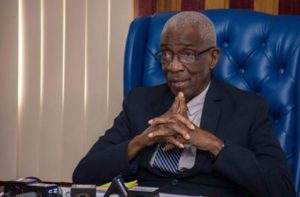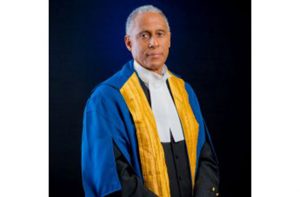…CCJ orders prior consultation between President, Jagdeo before submission of names
THE Trinidad-based Caribbean Court of Justice (CCJ), on Tuesday, overruled the courts here that the appointment of Justice (Ret’d) James Patterson, by President David Granger, as Chairman of the Guyana Elections Commission (GECOM), was unconstitutional on the basis that the process was flawed.

The judgment, in the case of Zulfikar Mustapha v the Attorney General, was handed down by President of the CCJ, Justice Adrian Saunders. It effectively overturns the decisions of the High Court and Court of Appeal, both of which had validated the process of appointing Justice (Ret’d) Patterson.
In arriving at the decision, the CCJ analysed the Constitution of Guyana with specific focus on the evolution of Article 161 (2), which was characterised by a significant shift from exclusivity and unilateralism, on the part of the President, to inclusion and consensualism between the President and the Leader of the Opposition.
Article 161 (2) not only addresses issues of eligibility of candidates for the position of Chairman of the Elections Commission, but mandates that the Leader of the Opposition submits to the President the names of six persons who satisfy the eligibility criteria, and, are not unacceptable to the President.
“Provided that if the Leader of the Opposition fails to submit a list as provided for, the President shall appoint a person who holds or has held office as a judge of a court having unlimited jurisdiction in civil and criminal matters in some part of the Commonwealth or a court having jurisdiction in appeals from any such court of who is qualified to be appointed as any such judge,” another section of Article 161(2) states, placing in the hands of the President, the power to appoint a Chairman of GECOM outside of the list provided by the Opposition Leader, once that list is unacceptable.
Justice Saunders said while the Article clearly underlined the importance of “consultation,” a clearly defined process for consensus between the President and the Leader of the Opposition was not stated. President Granger on October 19, 2017 activated the proviso in Article 161 (2), and appointed Justice (Ret’d) Patterson Chairman of GECOM, after he found that three lists of a total of 18 names, submitted by Opposition Leader Bharrat Jagdeo, were not acceptable. In an effort to arrive at an acceptable list, the President, at one stage, provided a Statement of the ‘Qualities of the Chairman of the Guyana Elections Commission,’ but the lists that followed were, according to him, still unacceptable.
The CCJ, however, ruled that the President and the Opposition Leader ought to have met prior to the submission of the list, and consulted on names. “The court decided that the most sensible approach to operationalising the article was for the Leader of the Opposition and the President to communicate with each other in good faith and perhaps even meet and discuss eligible candidates for the position of Chairman before a list is formally submitted,” Justice Saunders said.
CONSENSUS
He explained that consultation between the President and the opposition leader would have allowed for consensus and submission of a list of six persons who would have reached the eligibility requirements. “In this regard, the Constitution anticipates that the Leader of the Opposition and the President will conduct themselves in a reasonable and responsible manner, eschew partisanship and seek the best interests of the Republic and the Guyanese people,” the CCJ President added.
He said use of the double negative sent a clear message on how the President ought to have viewed the nominees or list provided.
“In our view, employment of the double negative, ‘not unacceptable’, signals that an onus is placed on the President not to find a nominee unacceptable merely because the nominee is not a choice the President would have himself made. By a majority, the court found, the President should only find a nominee unacceptable for some good reason on objective ground,” Justice Saunders told the parties in the matter.
He explained: “If a President were permitted, capriciously or whimsically, without proffering a good reason, to reject eligible nominees, this would frustrate the proper working of the Constitution, defeat the intention behind the amendment to Article 161(2) and pave the way for unilateral presidential appointment.”

He said the court found that once the President and the Leader of the Opposition have hammered out a list of names not unacceptable to the President, the list, comprising the six persons, must then formally be submitted to the President by the Leader of the Opposition. This would automatically be followed by the President’s selection of a chairman from among the names provided.
“In the court’s view, such an approach gives the President a role in the identification of the six names, but it obviates the possibility that, after the formal presentation of the list, the President could suggest that one or more of the names, or indeed the entire list, is ‘unacceptable’. In those circumstances a unilateral appointment by the President in keeping with the proviso to Article 161(2) can hardly be an option if the Leader of the Opposition demonstrates a willingness to engage in good faith the process outline,” Justice Saunders explained.
Based on the court’s assessment of the events that transpired between November 22, 2016, when the President invited the Opposition Leader to submit a ‘list of six persons, not unacceptable, and November 19, 2017 when the President rejected the third list and appointed Justice (Ret’d) Patterson, Justice Saunders said it is evident that the President was not entitled to lay down, as a precondition to considering a nominee, eligibility requirements that were additional to or at variance with those prescribed by the Constitution.
He said the judgment is not intended to cast aspersions on Justice (Ret’d) Patterson or the President. “Nothing in this judgment is intended, in the slightest degree, to cast aspersions on the competence and suitability of Justice Patterson for the position of Chairman of GECOM. Nor is there anything to suggest that His Excellency acted otherwise than in good faith,” the CCJ President clearly stated.
Nonetheless, he said given “the imposition on the Leader of the Opposition of criteria that were not sanctioned by the Constitution and the absence of cogent reasons for deeming unacceptable the candidates and lists provided,” the CCJ had no choice but to conclude that the process that was followed in the appointment of Justice Patterson was flawed and in breach of Article 161(2).
GIVING REASONS
In a concurring judgment, Justice Winston Anderson, noted that President Granger found each of the lists to be unacceptable but without giving any specific reason for their unacceptability.
“For substantially the reasons advanced by the learned President, I agree that the process followed in the appointment of Justice Patterson was fatally flawed and did not comport with the constitutional requirements. The history of its drafting and the wording of the provision in Article 161(2) clearly anticipate meaningful consultation, dialogue and compromise between the President and the Leader of the Opposition in the making of the appointment,” Justice Anderson said.
“How else could the Leader of the Opposition submit to the President, ‘a list of six persons, not unacceptable to the President?’” he reasoned. Both Justice Saunders and Justice Maureen Rajnauth-Lee paid special attention to the history of the Carter Formula which highlights a critical role of the opposition leader in the appointment of a GECOM Chairman.
“The council’s formula for the appointment of the Chairman of the Elections Commission for Guyana – commonly referred to as “the Carter formula” or “the Carter-Price formula” – was introduced by way of legislation into the Constitution of Guyana in a piecemeal fashion, beginning in 1991 with the Constitutional (Amendment) (No. 2) Act 1991 (“the 1991 amendment”),” Justice Rajnauth-Lee explained.

It was noted that the Chairman of the Elections Commission was still appointed unilaterally by the President, the 1991 amendment expanded the categories of persons qualified to be elected as chairman to include “any other fit and proper person”. The 1991 amendment also increased the number of the members of the commission, she posited.
“In 1995, the Constitutional (Amendment) Act 1995 (“the 1995 amendment”) was enacted and the formula for the appointment of the Chairman of the Elections Commission from a list of six persons, not unacceptable to the President, submitted by the minority leader, was introduced, albeit with a similar sunset clause,” she explained.
By the 1995 amendment, the minority leader was mandated to consult with the political parties represented in the National Assembly, other than the party to which the President belonged. In the year 2000, the Constitution (Amendment) Act 2000 (“the 2000 amendment”) was enacted and the amendments to Article 161 were incorporated into the Constitution.
Preliminary objections to Mustapha’s claims in the case, brought by the Attorney General, were rejected by the court.
The attorneys in the case included the Attorney General, Basil Williams, SC; Hal Gollop, QC; Ralph Thorne, QC; and Nigel Hawke, Guyana’s Solicitor General – all of whom appeared on behalf of the respondent. Douglas Mendes, SC; Anil Nandlall, and Nadir Sharma, were among the lawyers that appeared on behalf of the appellant.



.jpg)








